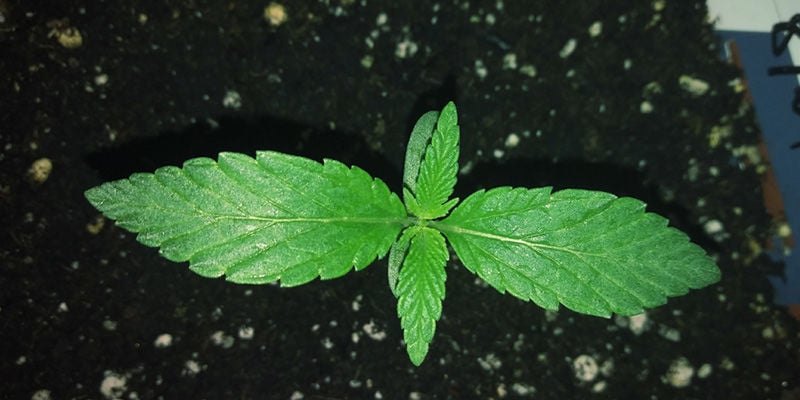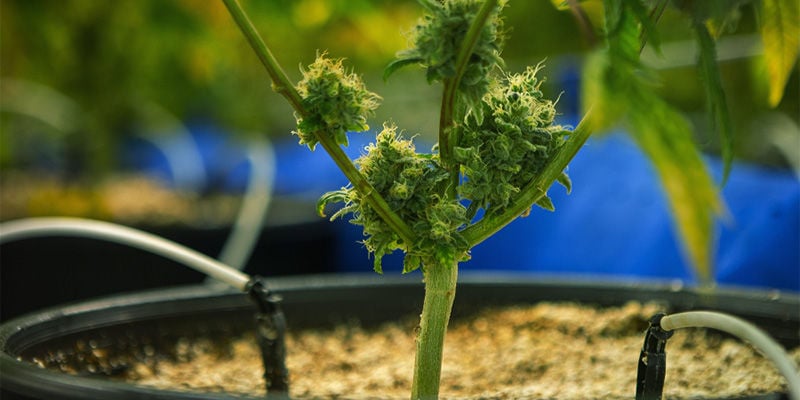
Comparing Liquid Nutrients Vs Granular Nutrients
There are plenty of anecdotes about what works best for cannabis plants, and everyone you ask will have their own techniques and tricks. But there is one common connection that links them, and that's the use of nutrients. But which type should you use? Liquid nutrients? Or granulated nutrients? Read on for a full comparison.
Sometimes we all need a little helping hand, whether it's that early morning coffee or an energy bar that sets us on our way for the day. This is certainly no different when it comes to our cannabis plants, and, while we don't recommend pouring coffee over them, providing them with nutrients is our way of making sure they get the best start to their growing cycle. In turn, you have a little more control and influence over their growth and development. You'll undoubtedly appreciate the rewards.
But what type of nutrients should you use? And why are they so important? By all means, you can cultivate your plants without, but it's certainly an area to consider. Let’s take a look at the two main types of nutrient products available, and explore the differences between them.
What Are Granular Nutrients?
Also known as dry, solid, or pellet nutrients, this is a type of fertiliser that doesn't require mixing with water initially. It is merely a case of adding granular nutrients to the substrate and then watering as usual. This will allow the plant to slowly and gradually absorb the nutrients, instead of the quick fix that liquid nutrients provide. Because of the low level of maintenance required, granular nutrients are fast becoming the go-to product for cultivators of all levels.
Pros and Cons of Granular Nutrients
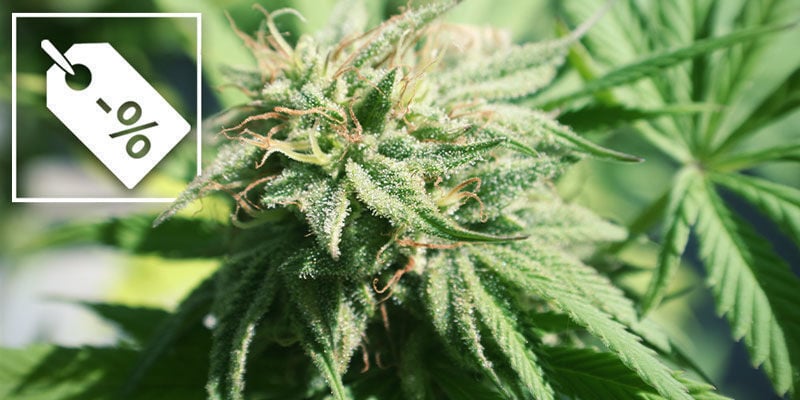
There are many advantages to using granular nutrients. Because of their slow absorption, less is required, and it goes much further—the gradual release of nutrients will provide ongoing support to your developing plant.
While this might be beneficial to some plants, it's not always appropriate for all setups. Some will need a faster-acting and more significant stream of nutrients. That said, unlike liquid nutrients, the risk of overfeeding with granular nutrients is minimal due to their gradual release. Granular nutrients are also cheaper overall. Buying in bulk will offer savings that you would not see with liquid nutrients, making them ideal for those new to the task of growing, as well as those who are a little more experienced.
Pros:
- Cheaper
- Low risk of overfeeding
- Single application goes much further
- Longer shelf-life
- Perfect for all growers regardless of experience
Cons:
- Risk of underfeeding
- Not as fast-acting as liquid nutrients
What Are Liquid Nutrients?
Liquid nutrients are often available as powdered sachets or bottled concentrates that are combined with water before use. These are then administered to the substrate to allow for efficient absorption by the roots. Available in two variations, synthetic nutrients will contain a chemical concoction full of essential elements that will aid plant growth, such as potassium, iron, and nitrogen. In comparison, organic nutrients are made from natural ingredients. Liquid nutrients are easy to use and highly concentrated—i.e. you get a lot of bang for your buck.
Pros and Cons of Liquid Nutrients
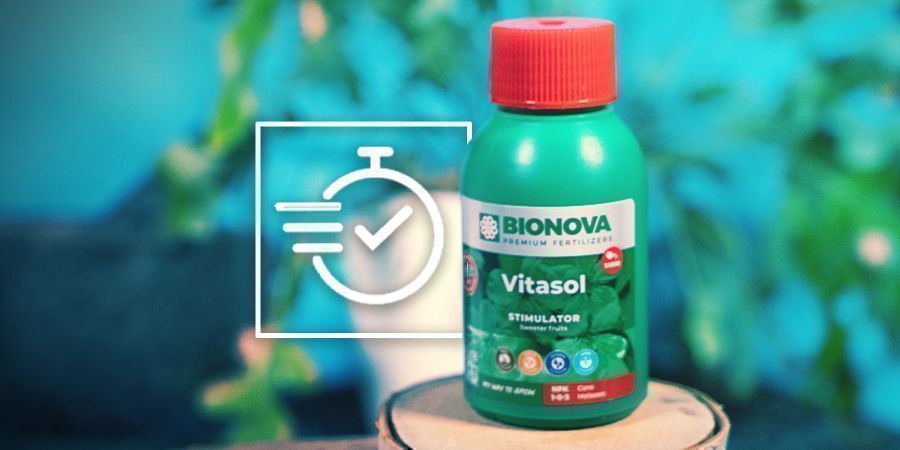
There are many positives to using liquid nutrients. As plants don't require a considerable amount, you'll find that a bottle lasts several homegrow projects. The fast-acting nature of liquid nutrients means they are perfect for helping your plant out should you notice any deficiencies, or if you want to give them a little boost. Because of this, it can be very easy, especially for the inexperienced, to overfeed their plants. So it's essential to always keep in mind that a little goes a long way with liquid nutrients.
There are many different varieties of liquid nutrients available to purchase, so you can easily find one to match the growing phase of your plant. Liquid nutrients in bottled concentrate form will often have a considerably shorter shelf-life than their granular counterparts. They can also be bulkier to store and trickier to move around if you are using them frequently.
Pros:
- Long-lasting
- Fast-acting
- Highly concentrated
- Easy to administer
- Versatile
Cons:
- Easier to overfeed
- Expense
- Shorter shelf-life
- Takes up more space
Difference Between Liquid Nutrients and Granular Nutrients
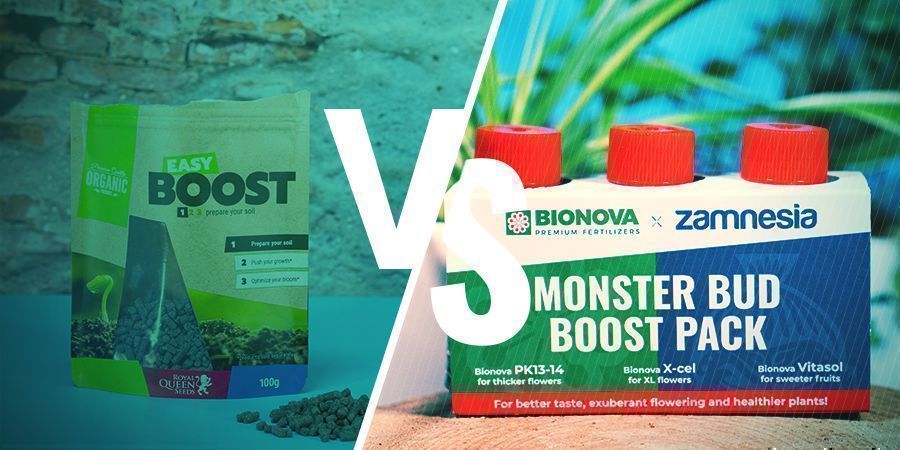
The main difference between liquid and granular nutrients is how they provide nutrients to your plants. Liquid nutrients offer that fast-acting boost and can perk up your plants quickly, whereas granular nutrients will gradually release nutrients, lasting much longer and not requiring the same amount of reapplication as the liquid variety.
Which Type of Nutrient to Choose?
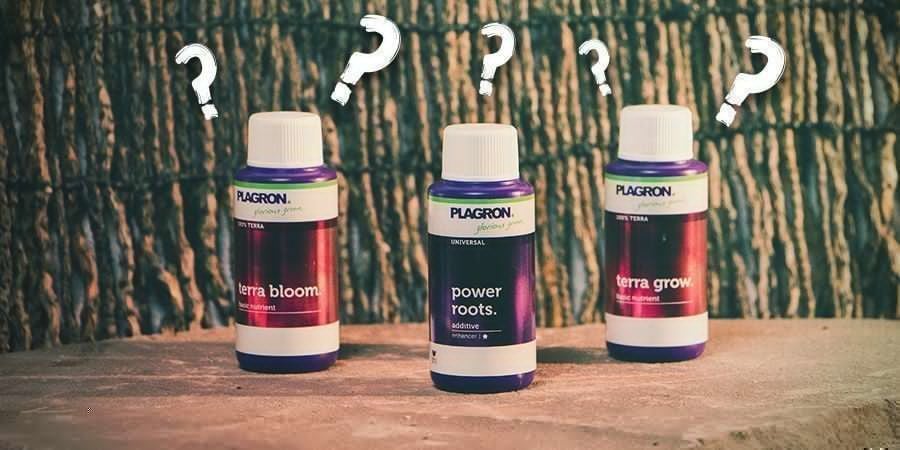
Deciding between each type of nutrient may seem like a tall order, but it doesn’t need to be. The variety that's best for you will depend on your strain, setup, and, potentially, your experience level. While some will prefer liquid nutrients, they tend to be more suited to hydroponic setups. With the plants being constantly submerged in water, nutrients can be dosed with greater ease.
However, the risk of damaging plants by overfeeding can be significant. Because of the nature of this complicated setup, it may require a little more experience and knowledge to use liquid nutrients. If it is something you're looking to do, simply take your time and research exactly what your plants need to thrive.
With granular nutrients, the process is a little more lenient, as risks such as overfeeding are not as prominent. Granular nutrients are best suited for soil-grown plants, giving them a steady stream of nourishment. Simply add the required amount to the substrate, and you're good to go. There's no special watering or maintenance regime—just continue monitoring your plants as you normally would. Because of this, granular nutrients are often a popular choice for the beginner or laid-back grower. And there's certainly nothing wrong with being a laid-back grower!
Granular nutrients such as the Monster Bud Boost Pack will certainly see that your plants thrive throughout each stage of their life. With easy-to-follow instructions, it's perfect for the budding botanist who wants zero hassle in their cultivation project. This power trio of finely tuned nutrients is the result of a collaboration between Zamnesia x Bio Nova, offering a diverse blend of enzymes, amino acids, and microorganisms that will give your cannabis the best quality of life as she grows.
Whichever type of nutrient you prefer, there's no denying the difference in quality you'll see in your plants. After all, they're yours to enjoy at the end of the growing cycle, so why not give them the best care you can?
-
 5 min
5 May 2025
Simple tips to grow better weed
Think growing great weed is hard? With a few essential weed-growing tips and some basic know-how, anyone can enjoy top-shelf harvests in any setup. Get acquainted with eight essential tips for...
5 min
5 May 2025
Simple tips to grow better weed
Think growing great weed is hard? With a few essential weed-growing tips and some basic know-how, anyone can enjoy top-shelf harvests in any setup. Get acquainted with eight essential tips for...
-
 5 min
29 September 2020
Use Monster Bud Boost Pack To Grow Fruitier Cannabis Buds
The Monster Bud Boost Pack helps you grow smarter, not harder, to harvest the payload of your dreams. Keep reading to find out how you can supercharge bud size and flavour.
5 min
29 September 2020
Use Monster Bud Boost Pack To Grow Fruitier Cannabis Buds
The Monster Bud Boost Pack helps you grow smarter, not harder, to harvest the payload of your dreams. Keep reading to find out how you can supercharge bud size and flavour.
-
 4 min
31 December 2018
What's The Difference: Synthetic Vs. Natural Fertilizer
Synthetic vs organic fertiliser is a heavily debated topic when it comes to growing cannabis. So let’s take a look at the advantages and disadvantages of each.
4 min
31 December 2018
What's The Difference: Synthetic Vs. Natural Fertilizer
Synthetic vs organic fertiliser is a heavily debated topic when it comes to growing cannabis. So let’s take a look at the advantages and disadvantages of each.









 United States
United States

